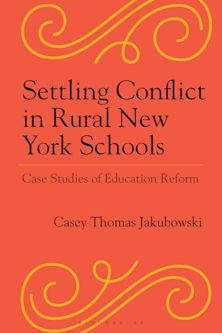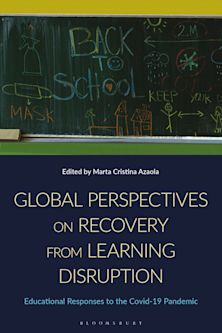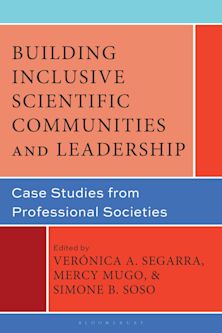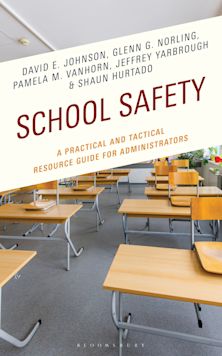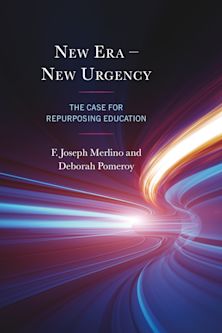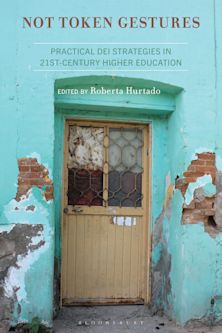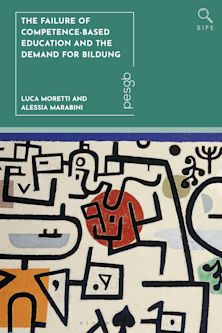- Home
- ACADEMIC
- Education
- Education Policy and Politics
- A Nation at Thought
A Nation at Thought
Restoring Wisdom in America’s Schools
A Nation at Thought
Restoring Wisdom in America’s Schools
This product is usually dispatched within 2-4 weeks
- Delivery and returns info
-
Flat rate of $10.00 for shipping anywhere in Australia
You must sign in to add this item to your wishlist. Please sign in or create an account
Description
This is a book about the education America owes to its children, why its education system is in poor condition, and what might be done to give that system both energy and quality. In diagnosing the current practices and priorities of American education, the book presupposes a collective public interest in creating a well-educated next generation. While focused on public schools, the book addresses the education of all of America’s children: What should well-educated future citizens learn in school?
Table of Contents
Acknowledgments
Introduction
Prolegomena: The Collective Good of Education
Chapter 1: The Unmet Goals of American Schooling
Chapter 2: The Great Distractors
Chapter 3: What Works—And Why We Don’t Do It
Chapter 4: The “Main Idea” in K-12 education
Chapter 5: Learning to Think
Bibliography
Index
Product details
| Published | 02 Mar 2023 |
|---|---|
| Format | Paperback |
| Edition | 1st |
| Extent | 224 |
| ISBN | 9781475867091 |
| Imprint | Rowman & Littlefield |
| Dimensions | 224 x 154 mm |
| Publisher | Bloomsbury Publishing |
About the contributors
Reviews
-
The first three chapters of former New York State Education Commissioner David M. Steiner’s new polemic follows in a long tradition of conservative policy makers’ critique of the state of schooling in the US. One thinks of California State Superintendent of Instruction Max Rafferty’s popular 1962 book Suffer, Little Children. Like Rafferty, Steiner advances familiar tropes about the decline of academic achievement, as measured by standardized assessments, due primarily to poorly prepared teachers who have been trained in progressivist schools of education. “Schools of education are largely [John] Dewey’s children,” Steiner claims (p. 67). Cultural heterogeneity and Dewey’s relativistic epistemology have confused educational aims and fragmented the traditional curriculum, compelling teachers to focus on such distractors as “the whole child,” critical thinking, social-emotional learning, growth mindset, GRIT, metacognition, and the like, and not on standard curriculum content. His critique of these straw men is ham-handed stuff, but the author redeems himself in chapter 4 by providing a well-reasoned analysis of the shortcomings of the basic skills orientation to literacy found in the Common Core State Standards and the work of E. D. Hirsch. A concluding chapter creatively taps Aristotle for newly defined purposes for secondary schooling. Highly recommended. All readership levels.
Choice Reviews
-
This is a truly important book: Readers may not agree with all of Steiner’s arguments – but they are worthy of deep engagement and should provoke thoughtful reflection. Steiner offers keen insights about our current K-12 education system with facts, powerful vignettes, and passion. His call for a re-imagining of American public education grounded in academic rigor and more compelling instruction is both inspiring and challenging.
John King, 10th U.S. Secretary of Education, President, the Education Trust
-
Only a writer and thinker of David Steiner’s erudition and empathy could deliver a book that lands simultaneously as both stirring encouragement and a stinging rebuke. He forces even those of us who believe we stand for high academic standards and lofty expectations for students to examine those beliefs, often uncomfortably. His message, both unsparing and optimistic, is not only that we must do better by America’s children, but that we can.
Robert Pondiscio, Senior Fellow, AEI
-
David M. Steiner’s book, A Nation at Thought, challenged me to recognize the pablum that too often passes for education in the U.S. today, especially in our middle and high schools; explains how we arrived at this dismal state; and poses a vision for education that offers students access to happiness through a pathway of thought. Steiner’s vision provides rich examples of the type of teaching and learning students would experience if only we were brave enough to undertake the mammoth work of redesigning U.S. education to provide instruction that is “ethically inspired, aesthetically rich and academically compelling.” Only then would students—and indeed, all of us—reach the state of human flourishing.
Heather G. Peske, President, National Council on Teacher Quality
-
In a day when schools are called on to serve every social and political mission our nation’s leadership can conceive, David Steiner has issued a clarion call to restore public schooling to its essence. An education, Steiner insists, is meant to build knowledge and to foster thoughtfulness. Its aspiration is for people to be wise and to be virtuous. An education system playing this role must thus have the focus and capability to emphasize learning and, yes, academic work. Steiner is unapologetic about the intellectual role schools play and about the value of intellect to a nation. His call to restore the centrality of thinking to America’s schools is a challenge to those who would use schools as vessels for all other things, from politicians to academics themselves. If you’re dissatisfied with thin, polarized debate on the direction of public education, read this book to see a better, if difficult, path forward.
John White
-
There is so much wisdom to be found within these pages. Commissioner Steiner has examined our education system from so many perspectives throughout his life and career: as an Englishman and as an American, as a respected academic and from the Commissioner’s seat as a practitioner, as someone with deep respect for traditions and with a keen eye for what’s on the horizon. Here he does what he does best—interweave research, experience, and stories from schoolhouses into a compelling treatise.
Christopher N. Ruszkowski, Former New Mexico Secretary of Education & CEO of Meeting Street Schools

ONLINE RESOURCES
Bloomsbury Collections
This book is available on Bloomsbury Collections where your library has access.












